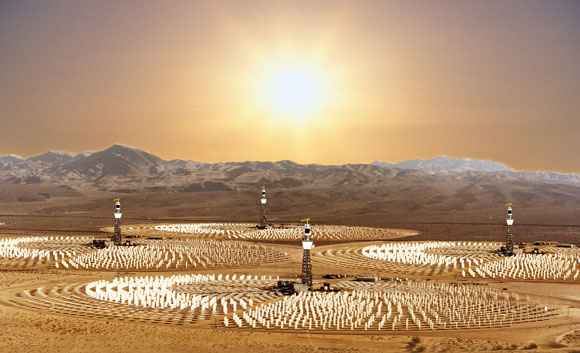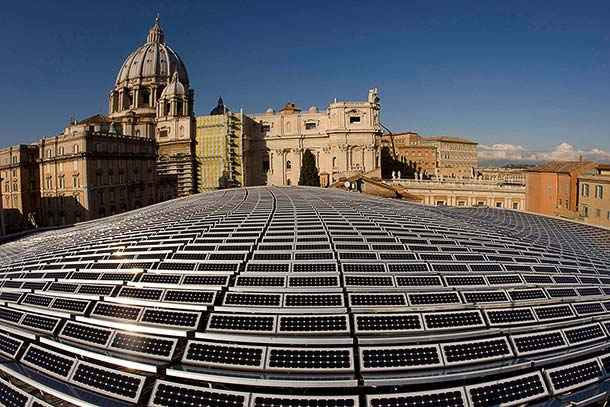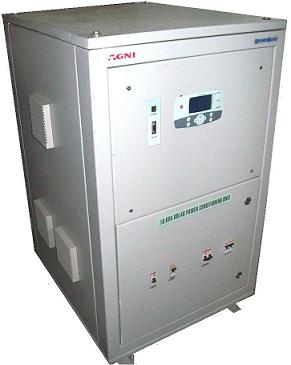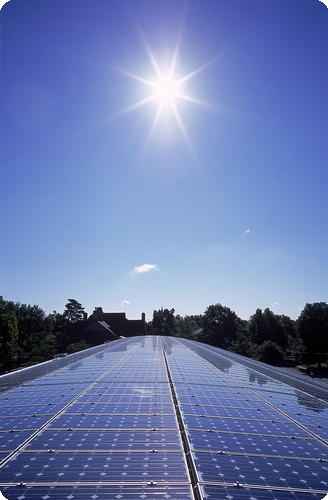Alternative Energy – SOLAR POWER (solar panels)
Solar energy is one the most resourceful sources of energy for the future. One of the reasons for this is that the total energy we receive each year from the sun is around 35,000 times the total energy used by man. However, about 1/3 of this energy is either absorbed by the outer atmosphere or reflected back into space (a process called Albedo).
Solar energy is presently being used on a smaller scale in furnaces for homes and to heat up swimming pools. On a larger scale use, solar energy could be used to run cars, power plants, and space ships.
Now, how do solar cells work?
The solar cells that you see on calculators and satellites are photovoltaic cells or modules (modules are simply a group of cells electrically connected and packaged in one frame). Photovoltaics, as the word implies (photo = light, voltaic = electricity), convert sunlight directly into electricity. Once used almost exclusively in space, photovoltaics are used more and more in less exotic ways. They could even power your house. How do these devices work?
Photovoltaic (PV) cells are made of special materials called semiconductors such as silicon, which is currently the most commonly used. When light strikes the cell, a certain portion of it is absorbed within the semiconductor material. This means that the energy of the absorbed light is transferred to the semiconductor. The energy knocks electrons loose, allowing them to flow freely. PV cells also all have one or more electric fields that act to force electrons freed by light absorption to flow in a certain direction. This flow of electrons is a current, and by placing metal contacts on the top and bottom of the PV cell, we can draw that current off to use externally. For example, the current can power a calculator. This current, together with the cell’s voltage (which is a result of its built-in electric field or fields), defines the power (or wattage) that the solar cell can produce.
Advantages
• Solar cells are totally silent.
• Solar energy is non-polluting.
• Solar cells require very little maintenance – they have no moving parts that need to be fixed
• Durability

Disadvantages
• Solar cells/panels are expensive to produce.
• Solar power cannot be created at night.
• Requires additional storage technology, such as batteries
• Requires alternative source of energy to ensure uninterrupted power flow.
• Single solar panels can only generate a relatively small amount of electricity
• Large arrays of solar panels are needed to provide a sufficient level of electricity
• Solar panels need to be adjusted throughout the day to maintain a direct angle with the sun
• Mechanical orientation system required to turn all of the solar panels.
• (UV) rays and other solar radiation causes the panels to deteriorate
• Rain and dirt affect power output

MAIN COMPONENTS of a SOLAR PANEL SYSTEM
• Solar panels – Solar panels charge the battery
• Charge controller – insures proper charging of the battery
• Battery – The battery provides DC voltage to the inverter
• Inverter – converts the DC voltage to normal AC voltage. If 240 volts AC is needed, then either a transformer is added or two identical inverters are series-stacked to produce the 240 volts.

continue with part 7 – Ocean Wave Energy



